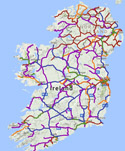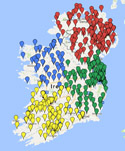
Rás Tailteann Finish
|
If you have come into cycling from another sport and have already raced in cycle races last season or plan to begin cycle racing this season this article looks at some aspects of training which will give you excellent benefits. This is the first of a series of articles focussing on cycling skills. The series should also be beneficial to sportive riders who will also have to cycle in large groups in the organised sportives in Ireland and abroad.
CYCLING IN GROUPS
This article will focus on cycling in groups which is the most fundamental skill for a racing cyclist
PHYSICAL FITNESS
This is often quite high with many of the new cycling participants as many are coming into cycling from other sports so basic fitness is often quite good. Training for cycling specific fitness now becomes more important.
Because cycling is thought of as physically very demanding (which it is) skills development is something that is often neglected when in fact skill is one of the most important components of all disciplines of cycling' For a great example of this try to look at a video of Fabian Cancellara winning the time trial in last years Worlds Championships, he is a very powerful rider and clearly one of the strongest pros.
However, if you look at the video notice how he corners, selects gears and paces the effort. How much time did he gain by taking the best lines on the corners, by using his gears well and pacing his effort to perfection? So even the humble time trial, which would be looked on as taking the least amount of skill to participate in has a high skill component if you are to be successful.
If riding on your own needs a certain amount of skill, its obvious that cycling in a bunch of 100 riders requires a very high level of skill just to remain in the group, let alone be the winner. Photo 1 Riders finish the last lap of the final stage of An Post Ras
Most of you will have experienced the difference of riding at the front of a group or sitting in the middle of a group where it is much easier. A rider sheltered in the middle of a group might only use 60% of the effort it would take if riding at the front of the group and taking the full force of fighting through the air.

Small group working together
|
WORKING IN SMALL GROUPS
This becomes really important as the races speed up and even the strongest riders spend a lot of time preserving energy by getting good shelter when they are not on the attack etc. Your performance in races will depend to a large extent on how you can get shelter when cycling in the group and retaining your energy to attack or sprint for race winning moves.

Fiona Meade shelters in group
|
Fiona Meade demonstrates clever positioning getting lots of shelter early in the Dublin City Criterium and being clearly the strongest at the finish

Fiona Meade winning the Halfords Dublin City Centre Criterium
|
Regardless of how physically fit and strong that you might be, There are a number of key skills that you must have if you are to consistently gain placings and points in races and to progress to higher categories. Indeed just to ride races safely requires a good level of skill.
THE SKILLS
- Cycling in large groups
- Fast cycling in groups
- Cornering
- Cadence
- Gears
- Braking
- Pacing your effort
CYCLING IN LARGE GROUPS
This is the basis of good performance in cycling. Following wheels/ changing in groups (up and overs) and is best practised when doing your long aerobic sessions in club groups.
So your first priority should be to join a good club that has regular organised group training sessions. These club training groups vary from less than ten in number to large groups either formed by a club group or sometimes riders from a number of clubs meet at a central point for these sessions.
These groups usually move along at a nice average speed with riders constantly changing positions between leading the group and sheltering in the group as the group rotates like a chain. This develops the ability to relax in the group, develops good pedalling skills and practises braking safely.
It is also most enjoyable and the highlight of many riders training. There is a social element to it as well where people are communicating with each other as they rotate through the group. These training groups can also be a great source of learning for new cyclists, maybe even the best way to gain experience as you are side by side with experienced riders and generally they will be helpful to newcomers.
CADENCE
The ability to pedal varies between people some people can pedal at very high cadence and others pedal at a slow rate. Initially aim for the most efficient cadence for the speed and effort that you are making. It takes time to develop a really smooth pedalling style and in my opinion the best way to do this is to be relaxed about it and use a cadence that is comfortable for you most of the time.
Over time and with increased cycling time this will increase in a very natural way. As your fitness increases you can include shorter periods of one or two minutes where you increase cadence to a high level (above 100).
Be relaxed about it especially in the early stage of training. If you aim to be between 80-100 rpm most of the time you should be fine. Some riders might be comfortable around 80rpm others might be able to spin at 90-100 revs. The important thing is to select cadence according to your ability and current fitness and what feels best for you.
Pedalling at higher revs will gradually become easier as you get fitter. Elite cyclists are believed to cycle at 90-100 rpm for most of their training. However if you insist on pedalling at a cadence that feels too fast for you for long periods of time you will become fatigued and are in danger of running into overtraining problems.
BETTER TO TRAIN ALONE?
I can hear some of you say, but is it not better to train alone, as its harder physically and my power meter or heart rate monitor shows me that I am only working at a low level some of the time when I am in the group?. This may be true to some extent and can be improved by having the groups smaller and made up of riders of the same ability.
However the social and skill benefits of cycling in groups cannot be under estimated and regardless of how hard you train its very unlikely that you will be successful if you cannot get shelter at crucial times especially when the race is moving very fast.
Future articles in this series
- Fast cycling in groups
- Cornering
- Gears
- Braking
- Pacing your effort





